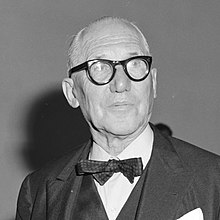Le Corbusier
Appearance


Charles-Édouard Jeanneret (October 6, 1887 – August 27, 1965), better known as Le Corbusier, was a Swiss-born French architect, designer, urbanist, writer, and one of the pioneers of what is now called modern architecture.
Quotes
[edit]

Vers une architecture [Towards an Architecture] (1923)
[edit]- Architecture is the masterly, correct and magnificent play of masses brought together in light. Our eyes are made to see forms in light; light and shade reveal these forms; cubes, cones, spheres, cylinders or pyramids are the great primary forms which light reveals to advantage; the image of these is distinct and tangible within us without ambiguity. It is for this reason that these are beautiful forms, the most beautiful forms. Everybody is agreed to that, the child, the savage and the metaphysician.
- The "styles" are a lie.
- Une maison est une machine-à-habiter.
- A house is a machine for living in.
- You employ stone, wood and concrete, and with these materials you build houses and palaces. That is construction. Ingenuity is at work.
But suddenly you touch my heart, you do me good, I am happy and I say: "This is beautiful." That is Architecture. Art enters in.
- It is a question of building which is at the root of the social unrest of today: architecture or revolution.
- Modern life demands, and is waiting for, a new kind of plan, both for the house and the city.
La Ville Radieuse [The Radiant City] (1933)
[edit]- The Despot is not a man. It is the Plan. The correct, realistic, exact plan.
"The Edict of Chandigarh," 1959
[edit]"The Edict of Chandigarh," plaque erected at Chandigarh, India as an abbreviated form of the document The Establishment Statute of the Land (1959-12-17)
- The object of this edict is to enlighten the present and future citizens of Chandigarh about the basic concepts of planning of the city so that they become its guardians and save it from whims of individuals.
- The city of Chandigarh is planned to human scale. It puts us in touch with the infinite cosmos and nature. It provides us with places and buildings for all human activities by which the citizens can live a full and harmonious life. Here the radiance of nature and heart are within our reach.
- Vehicular traffic is completely forbidden in the green strips, where tranquility shall reign and the curse of noise shall not penetrate.
- The age of personal statues is gone. No personal statues shall be erected in the city or parks of Chandigarh. The city is planned to breathe the new sublimated spirit of art. Commemoration of persons shall be confined to suitably placed bronze plaques.
- The truthfulness of materials of constructions, concrete, bricks and stone, shall be maintained in all buildings constructed or to be constructed.
The seed of Chandigarh is well sown. It is for the citizens to see that the tree flourishes.
Attributed from posthumous publications
[edit]- Space and light and order. Those are the things that men need just as much as they need bread or a place to sleep.
- The New York Times [obituary] (1965-08-28)
- Vous savez, c'est la vie qui a raison, l'architecte qui a tort.
- You know, it is life that is right and the architect who is wrong.
- Le Corbusier's reply upon learning that the housing project he had designed at Pessac had been altered by its inhabitants, quoted by Philippe Boudon, Lived-In Architecture: Pessac Revisited (1969) [trans. Gerald Onn]
- A hundred times I have thought: New York is a catastrophe, and fifty times: it is a beautiful catastrophe.
- My own duty and my aim is to try and raise people out of their misery, away from catastrophe; to provide them with happiness, with a contented existence, with harmony. My own goal is to establish or re-establish harmony between people and their environment.
- Le Corbusier: Architect, Painter, Poet by Jean Jenger (1996).


